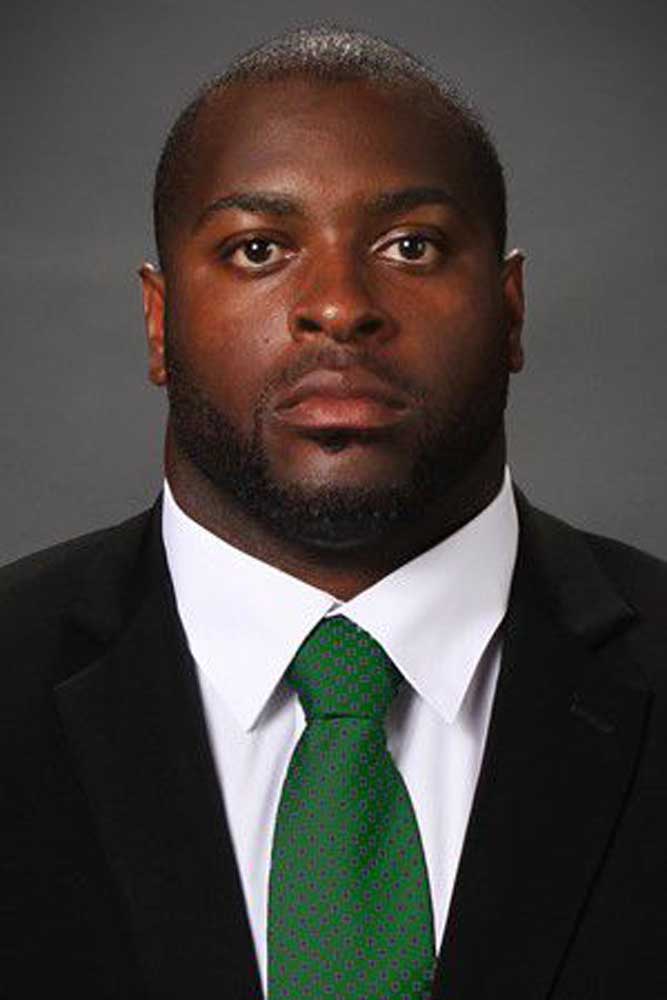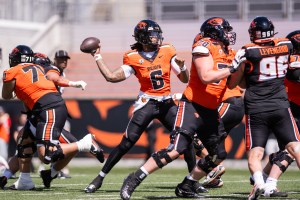Does suspended strength coach’s credential stack up?
Published 11:32 pm Thursday, March 9, 2017

- Oderinde
EUGENE — At Stanford, strength coach Shannon Turley holds a bachelor’s degree in human nutrition, a master’s in counseling psychology and a certificate from the National Strength Coaches Association, which named him its strength and conditioning coach of the year in 2013.
At Washington State, Jason Loscalzo has been certified by the NSCA, the Collegiate Strength and Conditioning Coaches Association, the Strength Performance Network and USA Weightlifting.
Trending
At Oregon State, Evan Simon has certificates from the NSCA and the CSCCA, a bachelor’s degree in health and physical education and a master’s in exercise physiology.
The credentials for Irele Oderinde, Oregon’s new strength coach, are not as lofty: a bachelor’s degree in recreation administration and a master’s degree in sport management, along with a strength and conditioning certificate from the U.S. Track and Field and Cross Country Coaches Association.
Oderinde’s qualifications have come under scrutiny after three Ducks football players were hospitalized with exercise-related illness, resulting in a one-month suspension without pay for Oregon’s new strength coach. All three players, including Bend’s Cam McCormick, have been released from the hospital.
Interviews with strength and conditioning professionals revealed conflicting views of Oderinde’s credentials, with some deeming them sufficient and others raising questions.
“The question has to be, is he qualified to do what he does?” said Jay Hoffman, a past president of the NSCA and chair of the Department of Educational and Human Sciences at the University of Central Florida. “… I would have to question whether he has the ability to do what he’s doing.”
Greg Shepard, a former strength coach at Oregon, Oregon State and with the Utah Jazz, offers his own certification program and has testified as an expert witness in trials involving weight-room incidents. The fact that Oderinde completed a certification program, he said, checks the necessary boxes and minimizes Oregon’s exposure to a potential lawsuit.
Trending
“What the jury wants to know is, was there a reasonable effort to get qualified to be a strength and conditioning coach?” Shepard said. “If he went through that certification, then I would say yeah, he made a reasonable effort.”
As of 2015, NCAA rules required Division I strength coaches to be certified by an accredited strength and conditioning organization. The CSCCA and the NSCA are considered the industry standards, but coaches can take other paths to certification.
Sam Seemes, executive director of the USTFCCCA, confirmed that Oderinde completed a 21-hour certification program offered by his organization in summer 2016. He said the course caters primarily to coaches in track and cross-country but is broad enough to apply across multiple sports.
“Because of who we are, we have a special emphasis that we add in regard to track and field,” Seemes said. “We don’t think it should just be strength and conditioning. Probably the majority, certainly not all, come from the track and field or cross-country background versus other certification courses.”
Asked if the course contained explicit emphasis on exercise-related illness, Seemes said he was unsure.
“The core of it is for strength and conditioning,” he said. “To be honest with you, I can’t really say. It’s A to Z.”
In Hoffman’s opinion, the USTFCCCA certification alone would not equip someone to be a competent strength coach. He also questioned whether degrees in recreation and sport administration would provide the necessary knowledge base.
“I think a bachelor’s in sports and exercise science or kinesiology, or the equivalent (is the minimum),” he said. “You have to have an understanding of basic biological science and how the body adapts to various stresses.”
The differing views point to the underlying question of what a strength coach should be: a weight-room motivator and drill sergeant or someone schooled in the science of biomechanics.
Hoffman expressed a strong belief in the importance of education to prepare coaches for any situation they might encounter.
“If people think of a strength coach as someone who counts the reps and motivates the athletes to do heavy weight on the barbells, it’s much more than that,” he said. “It’s a science.”
Shepard placed more emphasis on practical experience and said certification is primarily a way of mitigating legal liability in case of an incident.
“Truth be known, if I were to take all the experiences I have and rank them in importance as far as my ability in the weight room, certification would be way down the list,” Shepard said. “It doesn’t help you become a better coach. It helps you from the liability point of view.”
Oderinde, a former nose tackle at Western Kentucky, is not lacking professional experience. He has worked in strength programs at South Carolina, Notre Dame, West Virginia and South Florida, where he was director of athletic performance under coach Willie Taggart, the new football coach at Oregon.
At Oregon, Oderinde’s domain includes the 30,000-square-foot Marcus Mariota Sports Performance Center, which features a state-of-the-art sports science unit with recovery pods, motion-capture cameras, force plates and a neurocognitive center.
As technology has become more sophisticated, so have the expectations placed on strength coaches. In this world, Hoffman said, formal training is a necessity.
“It’s not something you pick up off the street,” Hoffman said. “Working with experienced strength coaches, you pick up a lot of information about how to do your job. But the basic science is learned in the classroom.
“If you don’t have the knowledge, how do you apply it?”
“ … I would have to question whether he has the ability to do what he’s doing.”— Jay Hoffman, past NSCA president








